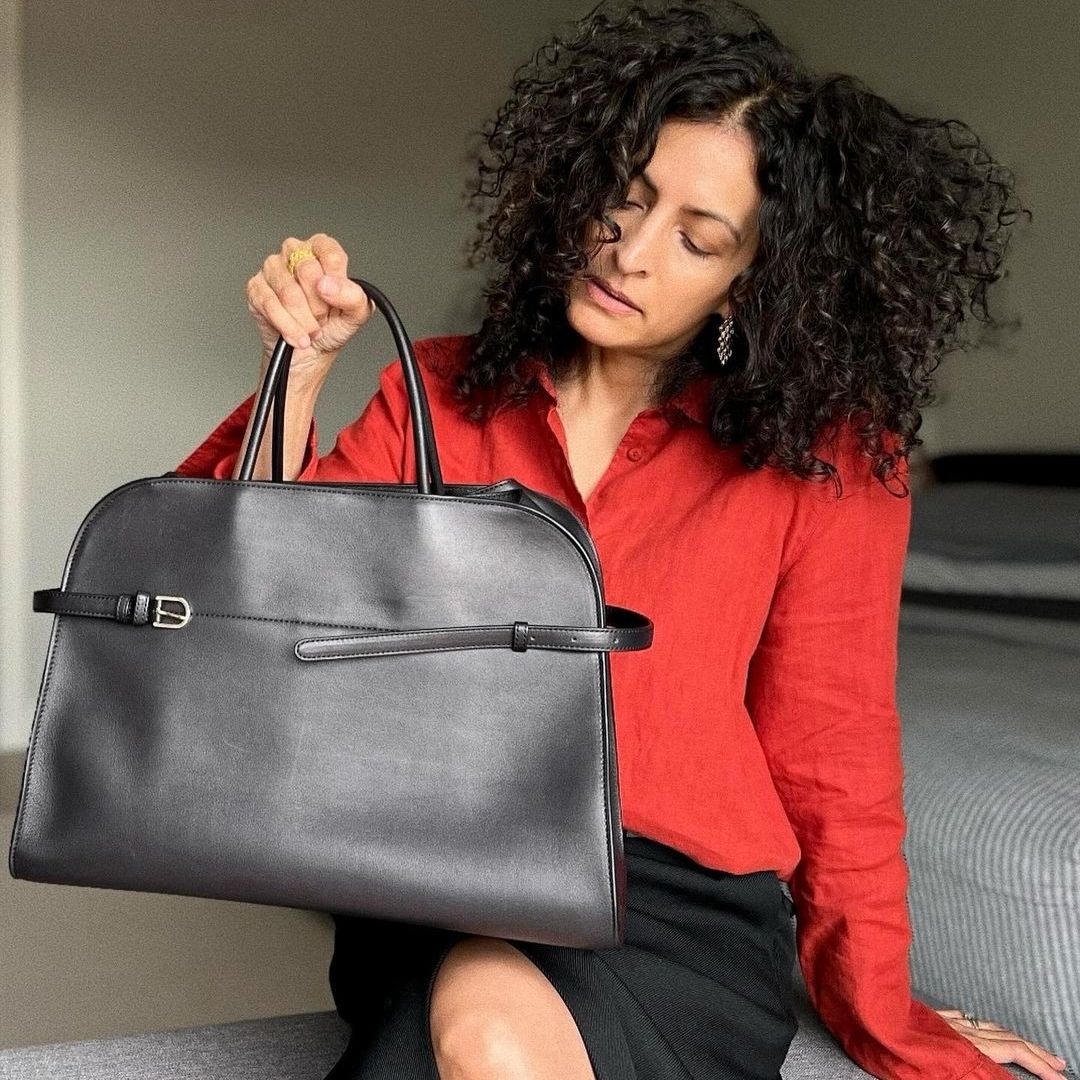
Most brands have customers; The Row has collectors. In just eight years, the New York-based label – known for its understated, impeccably crafted clothing and accessories – has won a cult-like following. The die-hard fans don’t just stop at one bag or coat, but rather fill their wardrobes with multiple pieces from the brand – and that’s despite the lofty prices (which start at £210 for a pair of cashmere socks).
The Row practically invented quiet luxury, though hackneyed a term it has become. There is no overt branding, no shoutiness. The palette is generally subdued, apart from the odd lipstick-red trouser or forest-green shirt. Even the house’s most popular exports – namely, the Margaux and Half Moon bags, Fisherman sandals and Ginza leather flip flops – aren’t immediately identifiable to the untrained eye, but that’s part of the allure. The brand’s only real signifier is the line – or ‘row’ – that runs down the back of each of their signature T-shirts (the garment that started it all).
‘I remember how fun it was when you were at an event, and you ran into someone who also had The Row on,’ says Mason Henry Howell, a handbag historian (and collector of The Row), who has worked with the likes of Christie's & Sotheby's. ‘You gave a nod, a wink, or a sly smile. [The Row] provides an anonymity that others who are a part of this club would recognise.’
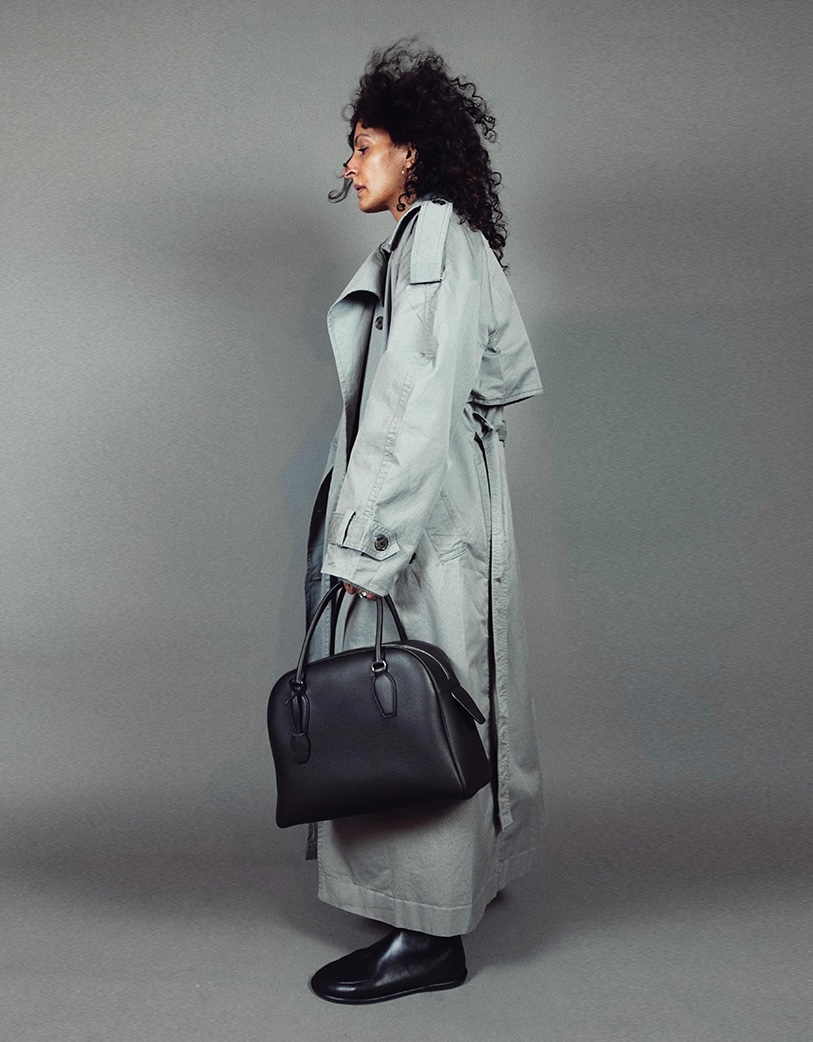
The ‘if you know, you know’ approach has worked wonders for the relatively young label. In the last Lyst Index, a quarterly ranking of the most coveted brands, The Row took 18th place, on account of a 93% increase in demand. As for the number-one hottest product, Lyst crowned The Row’s Margaux bag, a sell-out style that has been lauded as ‘the new Birkin’ – but more on that later.
The Row’s founders Mary Kate and Ashley Olsen were inciting cult-like devotion long before they launched the label. In the mid-aughts, the twins (who’d achieved fame at a young age for various acting roles) helped cement the boho-chic aesthetic via an oft-copied uniform of trailing skirts, superfluous scarves, oversized sunglasses, and even bigger bags. On a personal level, much of my 2004 was spent religiously saving every last street style image from the ‘MKAOlsen’ community on LiveJournal to a folder on my very slow PC. The group, which has been dormant since 2012, has just over 5,000 members at the time of writing – many of whom are probably now in their forties and either owners or admirers of a The Row bag (or five).
In other words, Mary Kate and Ashley had transformed their personal brand from tween stars to style icons. They already owned the hugely successful Dualstar Entertainment Group, a production company via which they also sold teenage clothing and merch. But they were older now, with an impressive collection of Birkins and a maturing fanbase who wanted to replicate their outfits. It made sense to create a high-end fashion brand.

In 2005, development for the perfect T-shirt began, and the following year The Row launched with a seven-piece collection, featuring that perfect tee, a pair of cotton-sateen leggings, and a cashmere dress. This carefully conceived capsule wardrobe signalled restraint, the name – a reference to London’s Savile Row – hinted at a commitment to craft and quality. The Olsens had started as they meant to go on.
Since its conception, the brand has won six CFDA awards and a very chic fanbase, including Ayo Edebiri, Sofia Richie, and Kendall Jenner. The term ‘Row-ification’ has even been coined to describe the marked rebranding of various celebrities’ style, in line with the label’s understated aesthetic. Jennifer Lawrence for example, not only owns the Margaux bag, but dresses almost exclusively in The Row’s milky neutrals.
Taylor Swift has also co-opted The Row since she began promoting her latest record, The Tortured Poets Department. The singer was photographed wearing a hooded cashmere dress and stompy boots from the brand earlier this year, and is pictured wearing a pair of The Row’s high-waisted knickers on the cover of the new album.
Importantly, The Row has inspired a hardcore of prolific collectors, including content creator Neelam Ahooja, who shares her favourite pieces and impeccably styled (Row-centric) outfits with her nearly-200k followers on Instagram, as well as in-depth bag reviews on YouTube. The piece that kick-started Neelam’s collection was, of course, one of the brand’s signature, oversized tees. ‘It was light and airy and I loved how the material felt and moved,’ she says.
When I ask Ahooja what she loves about the brand, she says, ‘[It is] expertly crafted, easy but elevated, and sometimes edgy.’
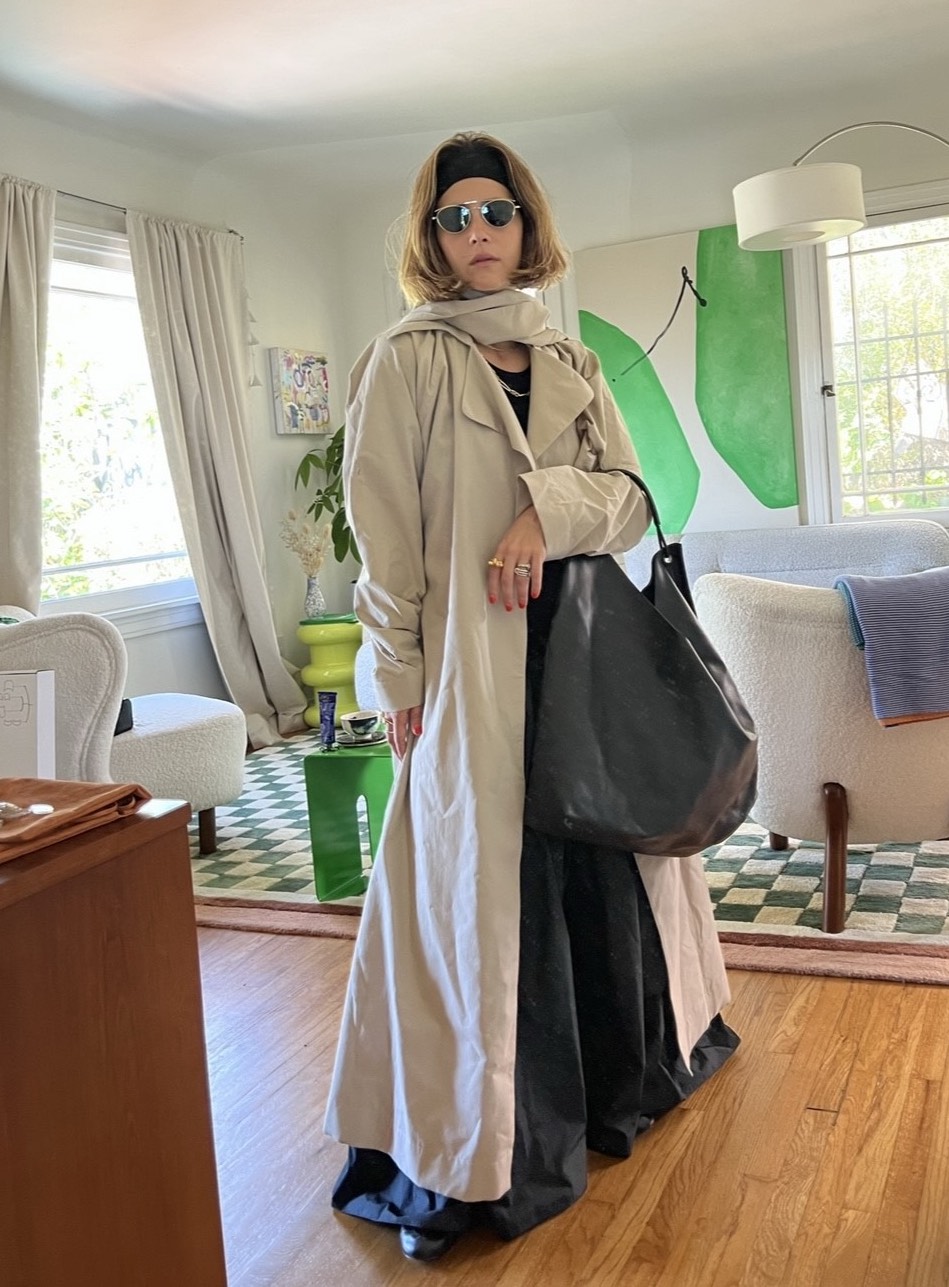
Whitney Olschwanger, a wardrobe stylist and brand consultant, agrees. ‘85% of each collection is absolutely timeless and never goes out of style,’ she says. ‘Then, you have about 15% fashion pieces where you’ll see special colours and interesting textures.’
That all-important edge is something The Row shares with – and according to The Lyst Index, fills ‘the sartorial hole left by Phoebe Philo’s departure from’ – old Céline. Cashmere knits and perfect tees and relaxed tailoring are always present and beautifully executed, but importantly, there are those artfully offbeat pieces (a scarlet leather skirt or '60s-inspired, heeled loafer, for example) that keep styling interesting and collectors coming back for more. That and the quality, which lovers of the brand claim is unrivalled.
‘The saddle leather, suede, and pebble leather feel just as great, if I dare say better, than a brand such as Hermès,’ says Mason Henry Howell. ‘When you touch The Row leather, especially the Margaux’s saddle leather, you’ll never want to go back. Even my Jasper shirt has made me never want any other cotton except for The Row’s!’
Olschwanger’s most-worn The Row pieces include the Half Moon bag in black, the Samia bag in brown, and the black scuba coat. ‘It is perfect,’ she says. ‘I made all of my clients buy it and we still talk about how much we love it.’
‘I love the lightweight cashmere crewneck sweaters, too,’ she says. ‘I usually get a black or grey and then one of the special colours from the seasonal delivery.’ On her current wish list? The XL Idaho bag, the Soft loafer in white and a black leather Margaux bag in size 17. ‘There are more things but I’m trying to behave,’ she laughs.
"The Margaux is to The Row what the Birkin is to Hermès."
It would be remiss to write a feature on The Row’s success and not discuss the aforementioned Margaux bag and its exponential rise. According to Lyst, searches for the trapezoid-shaped tote spiked 63% in the final quarter of 2023, and are up 198% year-on-year.
The Margaux is to The Row what the Birkin is to Hermès. Many comparisons have been made, and not least because of the bags’ hefty price tags – though at the £4-5k mark, The Row’s Margaux is almost half the price of an entry-level Birkin. Like Hermès’ mythic bag, the Margaux is a top-handled, leather tote that’s devoid of loud insignia, and identifiable only by subtle hardware – in this case, belt closures at either side. Oh, and it’s almost impossible to get hold of, selling out as soon as it hits the shelves. ‘We’ve seen numerous iterations of the Margaux bag sell out,’ says Libby Page, market director at Net-a-Porter. ‘It has been incredibly successful.’
The Row’s Margaux is available to anyone who is willing to pay the price tag and can find one in stock, which, as Howell notes, is an important point of difference to Hermès.
‘The Row doesn’t play the game of having to be “offered” a bag like Hermès does,’ he explains. ‘As long as I have shopped at The Row, they make it the most seamless, luxurious, and friendly process. For example, I bought my Margaux in 2022 over the phone while on the way to the airport for a work trip. That’s not something you can do at Hermès.’
Despite The Row’s comparatively democratic approach to retail, the Margaux’s scarcity means it is subject to inflated pricing on the resale market – such is the economic principle of supply and demand.
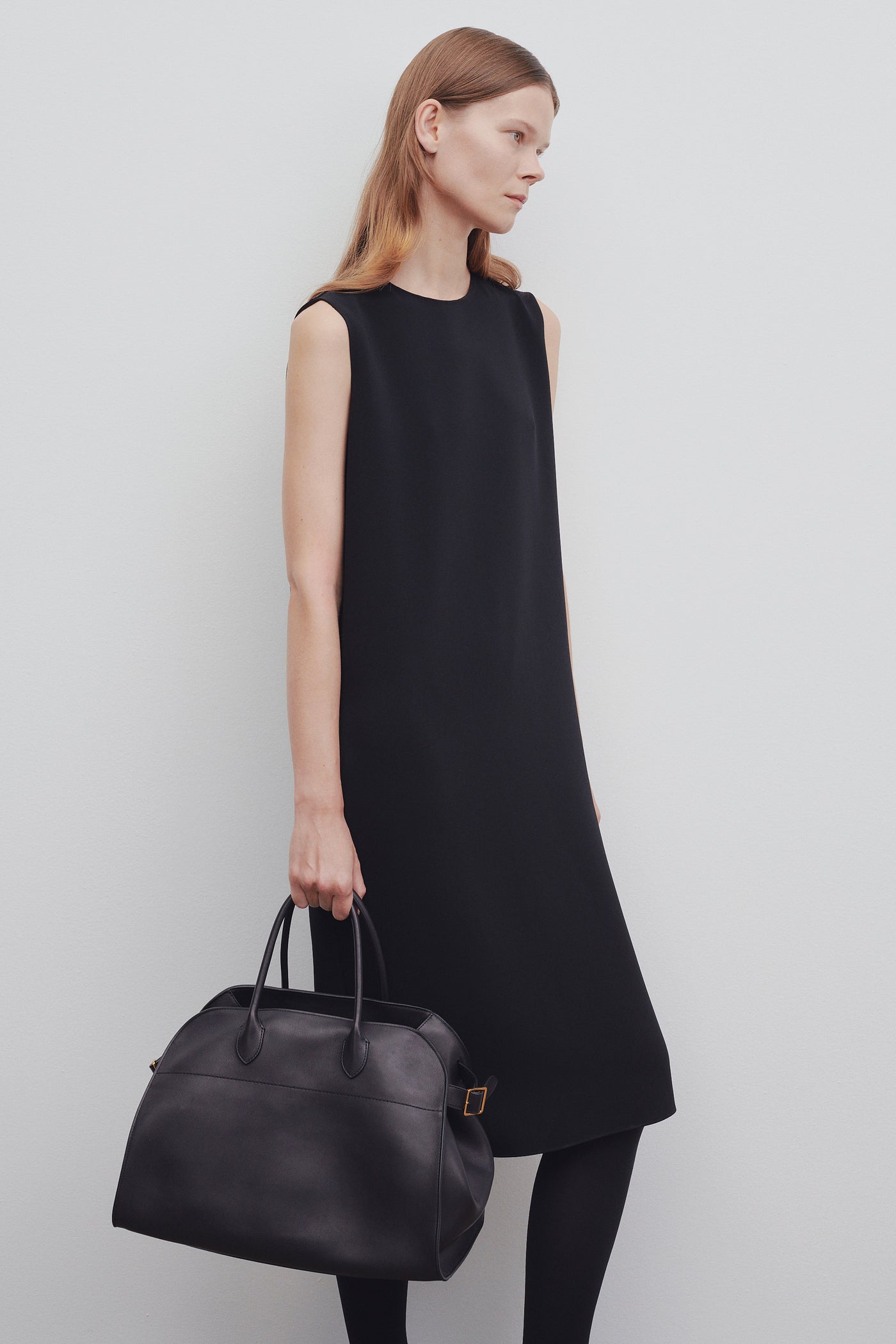
Howell has tracked the Margaux resale pricing since 2018. ‘Prices have climbed a little but stayed steady around £2,000 to £2,500 (50-60% of the retail price at the time) up until around 2023/2024,’ he tells me. ‘Now we see [Margaux bags] sell close to retail if not higher. As soon as one comes in, it sells out. I heard one client say they were offered a Margaux 17 for around £6,400 from a private reseller which is around 33% markup from retail.’
Judging by the data, the Margaux may well be a sound investment – if you can get your hands on one. If you can’t, what other The Row bags should you consider? The collectors I spoke to shared their favourites.
‘I’ve owned Hermès, Chanel, Louis Vuitton, and nothing has made me feel more comfortable and empowered than my The Row Sporty Bowler 19,’ says Howell. Meanwhile, Olschwanger extols the virtues of the Samia (‘It’s lightweight and easy to travel with, and sits well under the arm’), the Banana, and for travel, the XL Idaho.
‘My personal favourite day-to-day bag is a backpack and [The Row] makes plenty of nice ones,’ says Ahooja. ‘My Sporty canvas is my most-carried bag but I also love the 11, the Puffy, and I recently acquired Joe. There's something about the statement (or lack of statement) it makes that I'm drawn to – they're sloppy and very cool.’
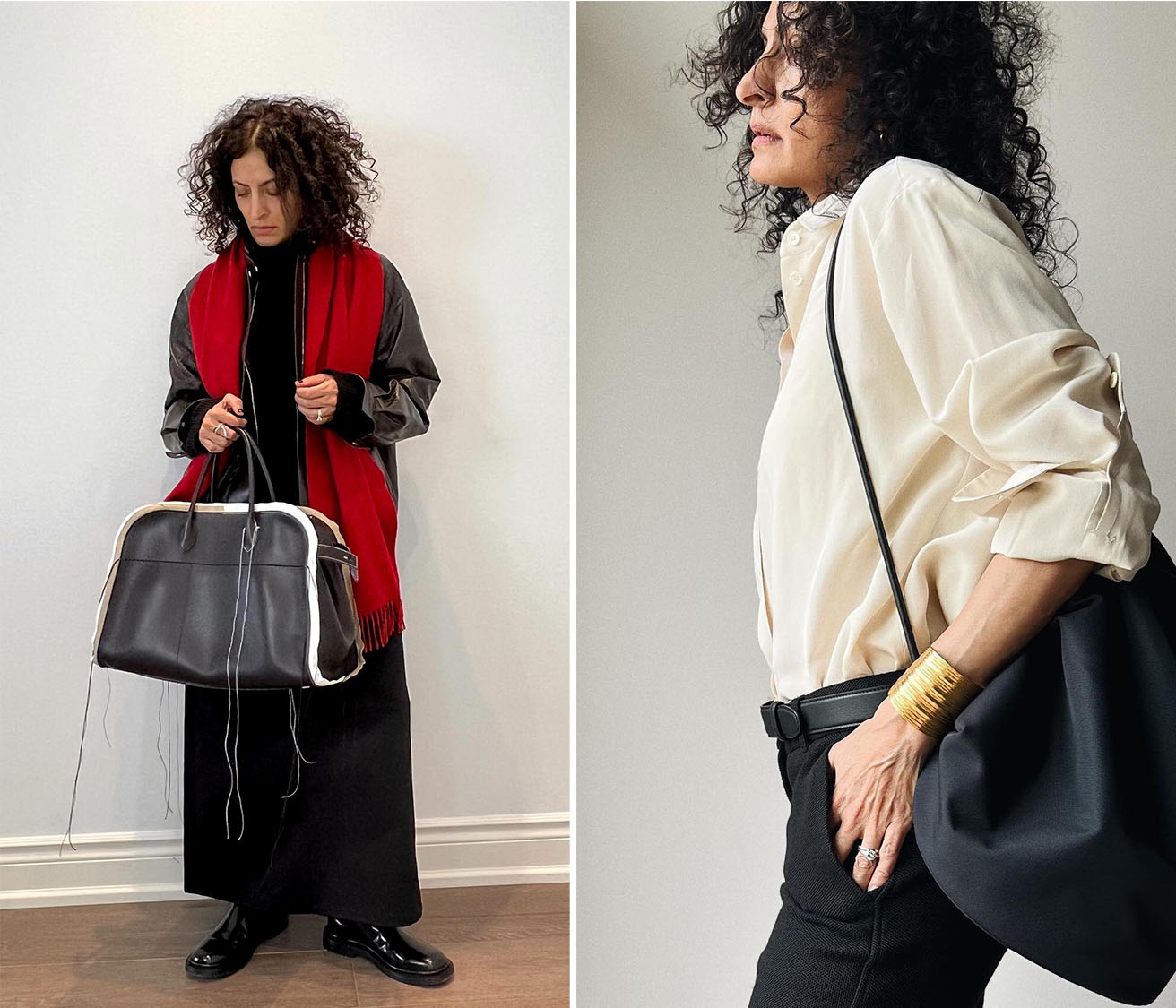
Indeed, The Row has mastered the elusive art of cool – and their reluctance to put everything out there on Instagram only makes them moreso. On Instagram, the brand posts irregularly and when they do, it’s mostly art. At The Row’s Autumn/Winter ‘24 show at Paris Fashion Week, the brand banned the sharing of content altogether. ‘We kindly ask that you refrain from capturing or sharing any content during your experience,’ the pre-show note read. In our always-on world, one may argue that being offline is the truest form of quiet luxury.
Polite defiance may well be the reason for The Row’s steady, stealthy success – a refusal to put it all out there and the prizing of design, craftsmanship and quality over all else, including accessibility. Not everyone can identify a Margaux bag; fewer still can afford one, and even then, getting one’s hands on the hallowed object seems to be a dark art. If The Row is a cult – and the monastic-chic slides don’t seem to prove otherwise – I may just have found my spiritual awakening.







